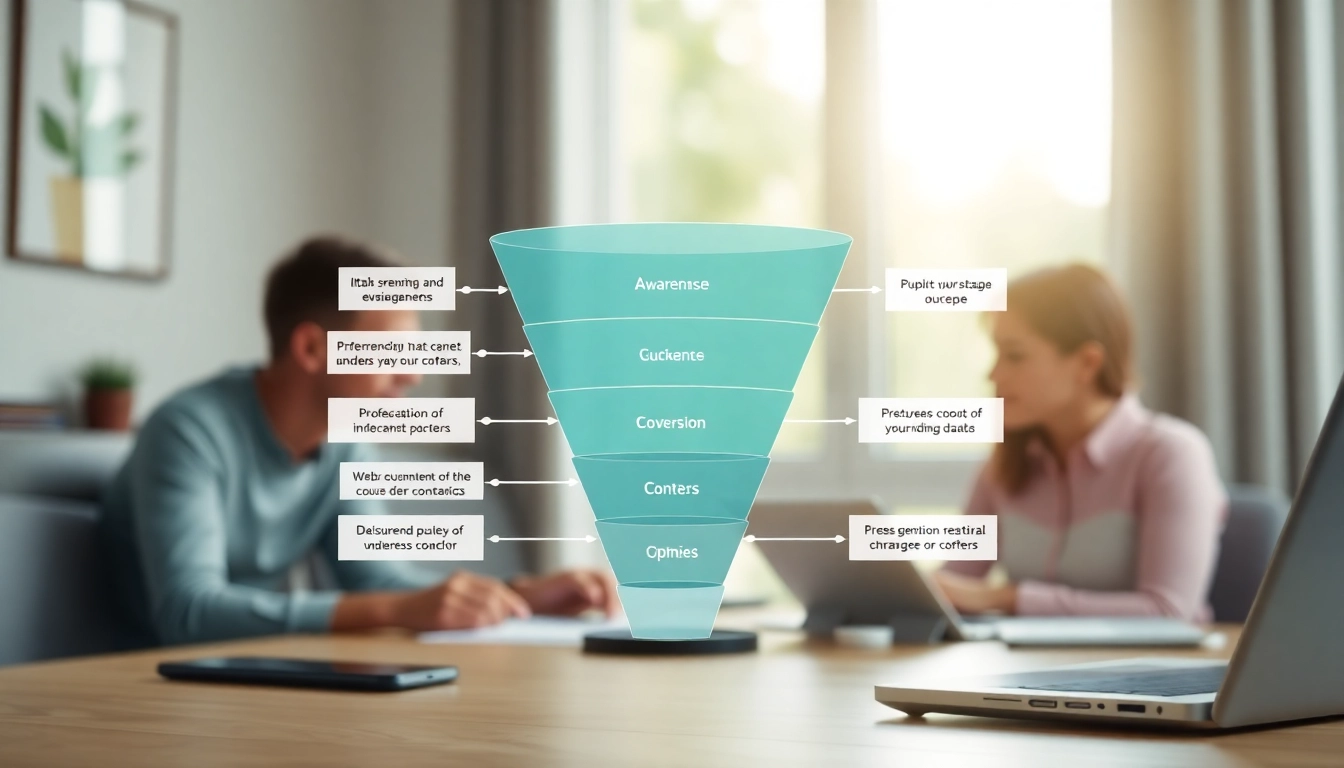Introduction to Effective Funnels for Coaches
In today’s competitive coaching landscape, having a well-structured sales strategy is imperative for success. For coaches aiming to connect with potential clients and convert leads into long-term relationships, the implementation of effective funnels is a game-changer. Funnels for coaches can streamline the process of acquiring clients, nurturing relationships, and ultimately driving revenue. In the following sections, we will explore the significance, types, and strategies to build and optimize funnels specifically tailored for coaching professionals.
Understanding Funnels for Coaches
A sales funnel is a systematic approach that outlines the journey potential clients go through before making a purchase decision. For coaches, this journey usually encompasses several stages, from initial awareness and consideration to final decision and post-purchase experiences. Understanding how these stages operate allows a coach to strategically craft interactions that resonate with leads while guiding them toward conversion.
The Importance of Effective Funnels
An effective funnel establishes a structured pathway for engaged prospects. It helps convert interested leads into paying clients. In fact, coaches who implement well-defined funnels can significantly enhance their ability to:
- Attract Quality Leads: By identifying and targeting the right audience, coaches can ensure that their marketing efforts yield high-quality leads.
- Build Relationships: Engaging clients through tailored content fosters stronger relationships and increases the likelihood of conversions.
- Maximize Revenue: A well-optimized funnel can lead to higher conversion rates and ultimately boost overall income.
Types of Funnels for Coaches
There are various types of funnels that coaches can employ, depending on their practice, audience, and business goals. Some of the most effective funnel types for coaches include:
- Lead Magnet Funnel: Creating a free resource (such as an eBook, checklist, or webinar) that captures interest and collects email addresses.
- Webinar Funnel: Hosting informative webinars that showcase expertise and provide value to potential clients while promoting services.
- Application Funnel: Allowing interested leads to apply for coaching programs can create a sense of exclusivity and enhance commitment.
- Sales Page Funnel: Directing prospects to a dedicated sales page where they can learn more about services, testimonials, and pricing to drive conversion.
Building Your First Funnel for Coaches
Identifying Your Ideal Client
The first step in creating a successful funnel involves pinpointing your ideal client. This requires a clear understanding of who they are, their pain points, and what drives their decision-making processes. To achieve this, coaches should:
- Conduct Market Research: Utilize surveys, social media polls, and interviews to gather data about potential clients.
- Create Client Personas: Develop detailed descriptions of your ideal clients, including demographics, challenges, and aspirations.
- Analyze Competitors: Study successful coaching brands to understand their target audience and adapt your strategies accordingly.
Selecting the Right Funnel Type
Once the ideal client is identified, the next step is to choose a funnel type that aligns with client preferences and behaviors. Selecting the right funnel can enhance engagement and improve the likelihood of conversions. Consider your coaching niche when defining your funnel:
- If your coaching focuses on lifestyle or wellness, a lead magnet funnel might work best.
- For business or high-ticket coaching, a webinar funnel can help provide in-depth value before pitching your services.
- Application funnels are excellent for niche coaching offerings, ensuring that clients truly value the service.
Creating Compelling Content for Each Stage
Effective content is the backbone of any successful funnel. As prospects progress through different stages, the content they encounter should resonate deeply with their needs. Implement the following strategies to craft compelling content:
- Aware Stage: Use attention-grabbing content such as blog posts, social media content, and free resources that resonate with your target audience’s pain points.
- Consideration Stage: Offer deeper insights through webinars or case studies, demonstrating your expertise and how your coaching services can solve their problems.
- Decision Stage: Provide testimonials, detailed service descriptions, and strong calls to action that encourage prospects to take the plunge and convert.
Advanced Strategies for Funnels for Coaches
Utilizing Automation Tools
Automation can significantly streamline your funnel process, saving time while maintaining engagement. Tools such as email marketing platforms and CRM software allow coaches to automate follow-ups, segment audiences, and manage leads efficiently.
- Email Sequences: Automate a series of emails that nurture leads based on their engagement and stage in the funnel.
- Chatbots: Implement chatbots on your website to answer queries in real-time, providing immediate assistance and information to potential clients.
- Lead Scoring: Use CRM tools to prioritize leads based on their engagement, focusing efforts on more promising prospects.
Integrating Social Proof
Social proof, such as testimonials and case studies, can build trust and credibility, encouraging prospects to take action. Coaches can leverage social proof by:
- Collecting Testimonials: Request feedback from satisfied clients and highlight their success stories on your website and funnel.
- Showcasing Case Studies: Create detailed case studies that illustrate how your coaching has transformed the lives of your clients.
- Using Reviews and Ratings: Display ratings from trusted review platforms to enhance credibility.
A/B Testing Your Funnel
To continuously improve your funnel’s performance, implement A/B testing to compare different versions of your content, emails, and landing pages. This testing can help refine your approach by analyzing:
- Headlines: Test various headlines to see which captures the most attention and leads to higher engagement.
- Call-to-Actions: Experiment with different CTAs to determine which phrases compel prospects to take action.
- Visuals: Assess the impact of images versus video on conversion rates to identify what resonates with your audience.
Analyzing and Optimizing Your Funnels for Coaches
Key Performance Metrics to Track
Effectively analyzing your sales funnel involves monitoring key performance metrics. These analytics help assess the health of your funnel and identify areas needing improvement. Monitor the following:
- Conversion Rates: Analyze the percentage of leads that convert to paying clients at each stage of the funnel.
- Drop-off Rates: Identify where leads are exiting the funnel, allowing you to address specific pain points and enhance retention.
- Engagement Rates: Track how frequently leads engage with emails, social posts, and content to gauge relevancy.
Identifying Bottlenecks in Your Funnel
Understanding the bottlenecks that hinder conversions is critical for funnel optimization. Examine your data to identify where prospects abandon the funnel, and implement strategic changes to enhance the overall flow:
- Analyze Traffic Sources: Evaluate the performance of different traffic sources to understand which channels generate the highest-quality leads.
- Segment Audiences: Identify which segments experience higher drop-off rates and tailor messaging to address their specific concerns.
- Conduct User Testing: Gather feedback from users about their experiences navigating your funnel to identify friction points.
Implementing Feedback for Continuous Improvement
To ensure ongoing success and relevance, implement a feedback loop with leads and clients. Gathering insights allows adjustments that can enhance engagement and conversion:
- Surveys and Polls: Utilize surveys to gather feedback post-engagement, learning what worked well and what could be improved.
- Follow-Up Conversations: Conduct follow-up conversations with clients to understand their experiences and areas for enhancement.
- Regularly Update Content: Refresh and update content based on feedback and emerging trends to sustain interest and engage clients.
Conclusion: Mastering Funnels for Coaches
Recap of Key Strategies
In summary, effective funnels for coaches are indispensable in reaching potential clients and facilitating easier conversions. By understanding your audience, selecting the right funnel types, and engaging prospects with compelling content, you can supercharge your coaching business. Leveraging automation, social proof, and continuous optimization through data analysis will provide you with the tools to enhance your performance significantly.
Next Steps for Success
Coaches looking to master their funnels should focus on the following steps:
- Begin with a clearly defined client persona to shape your funnels effectively.
- Choose a funnel type that aligns with your coaching philosophy.
- Utilize technology and metrics to enhance efficiency and drive results.
- Establish a regular review process for your funnels to ensure continued relevance.
Resources for Further Learning
To deepen your expertise on funnels for coaches, consider exploring additional resources, including ebooks, online courses, and community forums where fellow coaches exchange insights and strategies. Embracing a culture of ongoing learning will solidify your position as a successful coach in an ever-evolving market.



